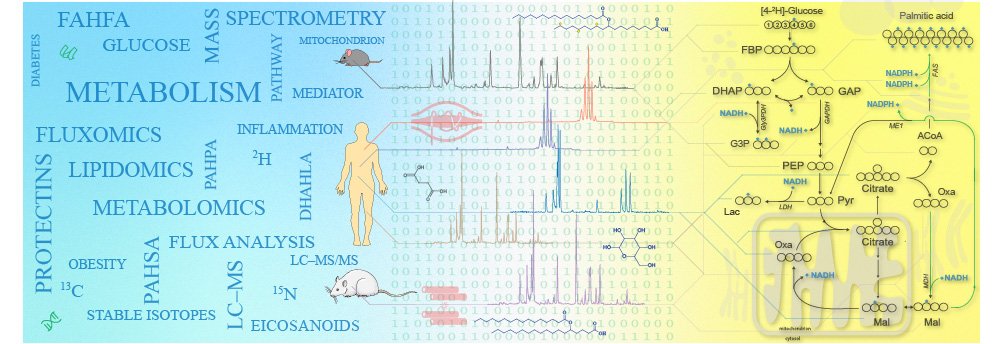
Metabolism of bioactive lipids
The Laboratory focuses on the analysis of lipid mediators (eicosanoids, docosanoids, endocannabinoids) using the UPLC-MS/MS method, in particular to identify the source of production of various mediators and their effect on metabolism and immune cells (i.e. adipocytes vs. macrophages). Currently, the lab is exploring new anti-diabetic lipids, fatty acid esters of hydroxy fatty acids and lipid-related metabolic pathways using stable isotopes and LIMeX platform.
 GTTAtlas - interactive metabolomics and lipidomics atlas of mouse tissues during oral glucose tolerance test (OGTT).
GTTAtlas - interactive metabolomics and lipidomics atlas of mouse tissues during oral glucose tolerance test (OGTT).
 MetaboAtlas21 - a comprehensive atlas of the mouse metabolome and lipidome.
MetaboAtlas21 - a comprehensive atlas of the mouse metabolome and lipidome.
 LORA - a Lipid Over-Representation Analysis tool.
LORA - a Lipid Over-Representation Analysis tool.
Projects
Software:
GTTAtlas
MetaboAtlas21
Mapper
Reaction network viewer
LORA
Methodological highlighs from publications using small molecule omics techniques.
More
White adipose tissue (WAT) is a complex endocrine organ and its low-grade inflammation in obesity contributes to the development of metabolic disorders. In 2014, a class of WAT-born lipid mediators - fatty acid esters of hydroxy fatty acids (FAHFA) was discovered. FAHFAs are endogenous lipids with anti-inflammatory and anti-diabetic properties, including the enhancement of glucose tolerance, and insulin and glucagon-like peptide 1 (GLP-1) secretion while reducing inflammatory responses [1-5].
More
Naturally occurring long-chain omega-3 PUFA, namely eicosapentaenoic acid (EPA; 20:5 ω-3), docosapentaenoic acid (DPA; 22:5 ω-3), and docosahexaenoic acid (DHA; 22:6 ω-3) exert multiple biological effects...
More
Our lab participates in OPEN SCIENCE initiative and hosts high school students with their project in metabolomics.
More
We run local instances of several services focused on Metabolomics, Lipidomics, Statistical analysis and Chemometrics. As the hardware resources are limited, these tools are available only within campus LAN.
More
Show more
Achievements
More
More
Our laboratory has been awarded the grant GA20-00317S New metabolic pathway in the synthesis of anti-diabetic lipokines (2020-2022).
More
Ondrej Kuda has been awarded Lumina Quaeruntur praemium.
More
Publications
Šiklová; M. - Šrámková; V. - Koc; M. - Krauzová; E. - Čížková; T. - Ondrůjová; B. - Wilhelm; M. - Varaliová; Z. - Kuda; Ondřej - Neubert; J. - Lambert; L. - Elkalaf; M. - Gojda; J. - Rossmeislová; L.
The role of adipogenic capacity and dysfunctional subcutaneous adipose tissue in the inheritance of type 2 diabetes mellitus: cross-sectional study
.
Obesity. 2024; 32(3); 547-559
.
IF = 6.9
[ASEP]
[
doi
]
Čajka; Tomáš - Hricko; Jiří - Rakušanová; Stanislava - Brejchová; Kristýna - Nováková; Michaela - Rudl Kulhavá; Lucie - Holá; Veronika - Paučová; Michaela - Fiehn; O. - Kuda; Ondřej
.
Hydrophilic Interaction Liquid Chromatography–Hydrogen/Deuterium Exchange–Mass Spectrometry (HILIC-HDX-MS) for Untargeted Metabolomics
.
International Journal of Molecular Sciences. 2024; 25(5); 2899
.
IF = 5.6
[ASEP]
[
doi
]
Vondráčková; Michaela - Kopczynski; D. - Hoffmann; N. - Kuda; Ondřej
.
LORA; Lipid Over-Representation Analysis Based on Structural Information
.
Analytical Chemistry. 2023; 95(34); 12600-12604
.
IF = 7.4
[ASEP]
[
doi
]
Song; J. - Duivenvoorde; L. P. M. - Grefte; S. - Kuda; Ondřej - Martínez-Ramírez; Felipe - van der Stelt; I. - Mastorakou; D. - van Schothorst; E. M. - Keijer; J.
Normobaric hypoxia shows enhanced FOXO1 signaling in obese mouse gastrocnemius muscle linked to metabolism and muscle structure and neuromuscular innervation
.
Pflugers Archiv - European Journal of Physiology. 2023; 475(11); 1265-1281
.
IF = 4.5
[ASEP]
[
doi
]
Martínez-Ramírez; Felipe - Riečan; Martin - Čajka; Tomáš - Kuda; Ondřej
.
Analysis of fatty acid esters of hydroxy fatty acids in edible mushrooms
.
LWT-Food Science and Technology. 2023; 173(1 Jan)); 114311
.
IF = 6.0
[ASEP]
[
doi
]
Show more
Show more




 Metabolism of bioactive lipids
Metabolism of bioactive lipids







